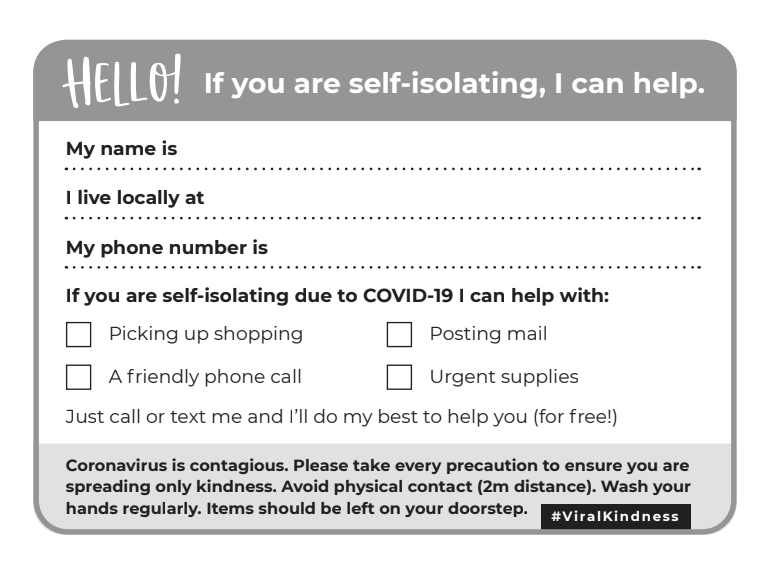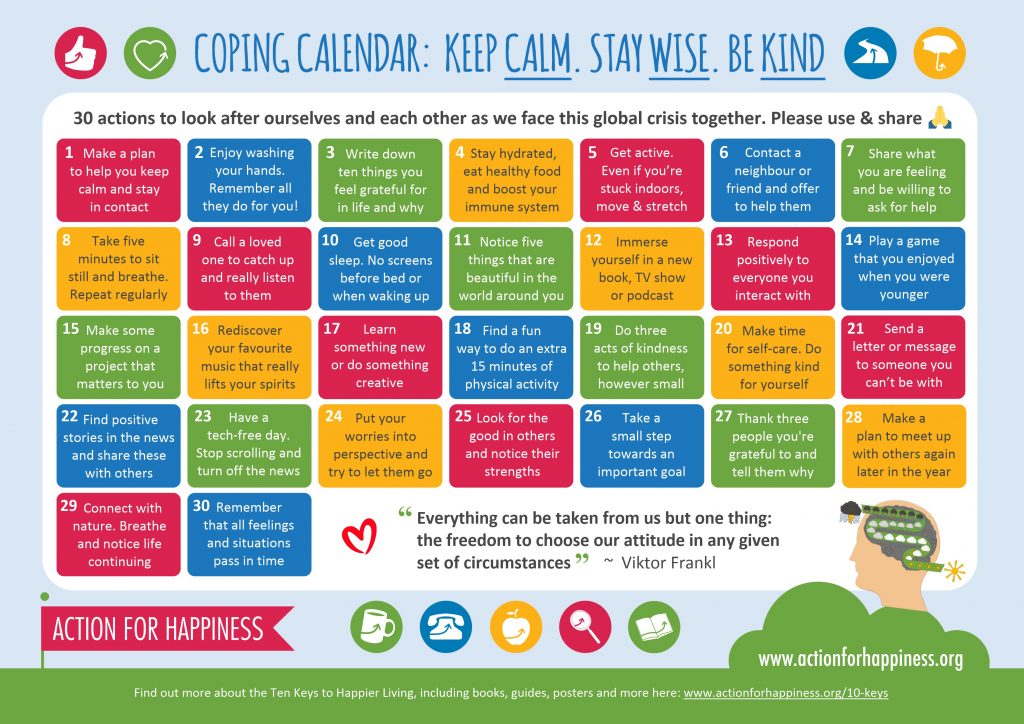“The greatness of a community is most accurately measured by the compassionate actions of its members.”
These challenging times have got us thinking about this quote from American civil rights activist, Coretta Scott King. As we all try and muddle through these uncertain times, one real positive that has come out of this is all the shining examples of compassionate communities that we’ve been hearing.
We’ve heard of neighbours filling up a box to take to the local foodbanks, an online disco for over 50s, people offering to provide tech-support to set up Zoom calling, dog walking, childminding… the list goes on. It shows just how powerful communities can be and how much we care for those around us.
Looking after ourselves can mean avoiding the virus, but it also means looking after our mental wellbeing. For different reasons, some of us are being advised to stay indoors for long periods of time. But it’s still important to keep active and keep well.
Avoiding in-person social contact, does not have to mean avoiding social contact. We know that loneliness can be a huge issue for people in Scotland, whether a person is socially isolated or not. Now, more than ever, we need to be looking out for each other.
We’ve started putting together the following advice, but if you have suggestions for things to add, please let us know.
How to help build strong inclusive communities:
Are there people who you know who live locally and who might be alone? Or maybe struggling with anxiety or mental health?
You can download this form and print it off and stick it in your close, or post it through your neighbours doors (making sure you follow all guidance regarding hand sanitising first). Download printable version here.
Support your local foodbank, who may be struggling with donations at the moment and are well placed to distribute essentials to those who need them most.
How to keep busy
- NASA has made their entire media library public.
- Download free colouring books from 113 museums
- Stay at Home Fest: An online music festival! (crowdsourcing all the online gigs people are putting on)
- 12 Museums offering virtual tours
Parenting Resources
- The Green Parent round-up of resources and sites
- Easy Science for Kids
- Easter Activities suggestions
Where to find practical support
- Mutual Aid Groups are being set up in towns and cities all over the country. There’s a full list of them here.
- Nextdoor is an online neighbourhood hub “for trusted connections and the exchange of helpful information, goods, and services.” It can be a useful source of local advice and place where people can share offers of support and ask for help. See if there is a local group here.
- Face-to-face contact can still happen virtually. Skype is an easy-to-use online video calling service that you may find useful, as is Zoom video calling.
- Helpful Peeps is another app that connects up people in your local community.
Where to get other types of support
- If you are an older person in Scotland and fancy a chat, or just want to hear a friendly voice, call the Age Scotland helpline – they always have time to talk. 08001244222
- Whatever you’re going through, you can call Samaritans any time day or night, 365 days a year. Call them free on 116 123 or email them at jo@samaritans.org
- The Silver Line is there to provide free confidential information, advice or friendship to older people 24 hours a day and 7 days a week on 0800 470 80 90
- If you are are a child or young adult and feeling lonely, you can call SupportLine on 01708 765 200
- The Calm Zone is a helpline offering support to men, of any age, who are down or in crisis, 0800 585858.
- Staying at home can be particularly difficult for some people, who might be experiencing abuse or other issues. Zero Tolerance lists some useful helplines.
- Breathing Space is a free and confidential phoneline service for anyone in Scotland who is experiencing low mood or depression. Call them on 0800 83 85 87
Support for Children and Families
During these difficult and uncertain times for us all, it is our most vulnerable families who will be hardest hit. Children 1st are determined to maintain direct, practical and emotional support to children and families wherever it is safe to do so. Their Parentline service will be giving a helping hand to any family in Scotland that needs it – on the phone: 08000 28 22 33, by webchat or online: children1st.org.uk/parentline.
Wellbeing hints and tips
- A Psychiatrist’s Guide to Coping with COVID19
- How to look after your mental health during the Coronavirus outbreak
- Calm have curated content hand-picked to support your mental and emotional wellness through this time
Where to find out the latest health news and government advice
- The UK Government advice including on how to protect yourself up-to-date info on the virus.
- Health Protection Scotland offers latest public health advice for Scotland.
- NHS Inform offers latest guidance on symptoms and actions to take.
- NHS Inform have created this communications toolkit, that is now available in different languages and British Sign Language.
Where to find help and support for charities and community organisations
- The Scottish Community Development Centre (SCDC) have created this list of support and useful links for community groups responding to COVID-19 in their communities.
- The SCDC have also launched a survey to find out what support community groups need during these difficult times
- SCVO “have pulled together some information & resources to help you, your organisations and your communities stay safe and healthy.”
- FAQs and advice from Scottish charity regulator, OSCR
Working from home tips and advice
- Our tips for keeping well when working from home
- Tech Against The Coronavirus is a useful list of digital options that may be useful to you
- SCDC are offering free guidance for community organisations on how to work digitally
Finally, there are lots of good ideas in this Coping Calendar from Action for Happiness:
The Outside The Box team will be working remotely for the time-being, and all our public meetings and events have been put on hold. It is best to get in touch with us via email, and we can then arrange Skype/Zoom/phone calls as necessary. If there’s anything you feel we can support you with, please just let us know.


